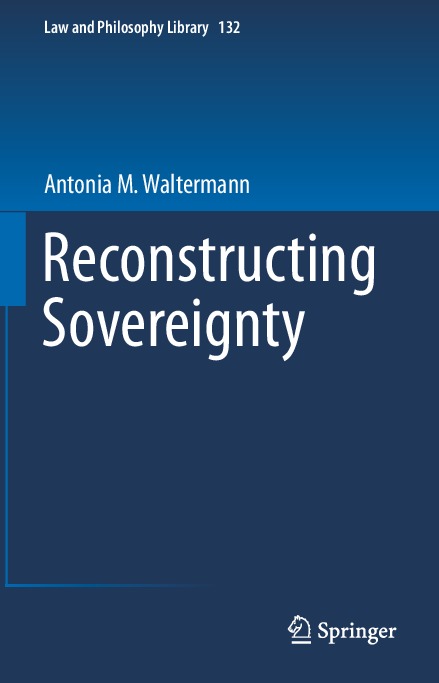File #2645: "2019_Book_ReconstructingSovereignty.pdf"
Text
1|Preface|6
1|Contents|7
1|Chapter 1: Preliminaries|10
2|1.1 Introduction|10
3|1.1.1 What This Book Aims To Be, and What It Does Not Aim To Be|12
2|1.2 Why Stipulate More Definitions?|13
2|1.3 Overview|14
2|References|15
1|Chapter 2: Sovereignty in the Law|17
2|2.1 Legal Concepts|19
2|2.2 Inferential Analysis of ``Sovereignty´´ in International Law|24
2|2.3 Inferential Analysis of ``Sovereignty´´ in National Law|30
3|2.3.1 Consequences of MCDS|33
3|2.3.2 Attributed to State or State Organ?|37
3|2.3.3 Attributed to the People?|38
2|2.4 Implications|40
2|References|43
1|Chapter 3: Sovereignty Outside of the Law|45
2|3.1 Constitutive Sovereignty Is Extra-Legal|46
2|3.2 The Core of Constitutive Sovereignty (MCVS)|48
3|3.2.1 The State and the Legal System Emanate from the People|49
3|3.2.2 Excursion: Social Conventions and Social Rules|55
3|3.2.3 Defining the People|65
3|3.2.4 The Two Sides of Municipal Constitutive Sovereignty|69
3|3.2.5 Intermediate Conclusion: Municipal Constitutive Sovereignty So Far|70
2|3.3 Implications of This Conception|71
3|3.3.1 Sovereignty as a Matter of Degree|71
3|3.3.2 Exclusivity|72
3|3.3.3 Constitutive Sovereignty and Legitimacy|73
2|3.4 International Constitutive Sovereignty (ICVS)|77
3|3.4.1 States Constitute International Law|78
3|3.4.2 Social Rule or Contract?|81
3|3.4.3 Who Is Sovereign (ICVS)?|83
3|3.4.4 Concluding Remarks|84
2|References|85
1|Chapter 4: Questions About Sovereignty|88
2|4.1 Relationship Between Sovereignties|89
3|4.1.1 Constituted and Constitutive|89
3|4.1.2 National Constituted and International Constitutive|90
3|4.1.3 International Constituted Sovereignty and National Constitutive Sovereignty|92
3|4.1.4 The Impact of Mastery on Sovereignty|93
3|4.1.5 Concluding Remarks|98
2|4.2 Is the Concept of Sovereignty Necessary?|99
2|4.3 Sovereignty Relative to What?|101
2|4.4 Limited or Not?|102
2|References|103
1|Chapter 5: Sovereignty in Context|105
2|5.1 Sovereignty and Secession: Scotland, Catalonia, and Quebec|106
3|5.1.1 Catalonia|107
3|5.1.2 Quebec|110
3|5.1.3 Scotland|111
2|5.2 Municipal Constituted Sovereignty and the European Union|113
3|5.2.1 Are the Member States of the European Union Still Sovereign?|113
3|5.2.2 Is the European Union Sovereign?|114
2|5.3 Not the People but God?|118
2|5.4 Humanitarian Intervention|120
2|5.5 The Role of Recognition|123
2|5.6 Concluding Remarks|127
2|References|128
1|Chapter 6: Other Accounts|131
2|6.1 Monarchical Sovereignty|132
3|6.1.1 Jean Bodin´s Theory of Sovereignty|132
3|6.1.2 Thomas Hobbes´ Theory of Sovereignty|136
3|6.1.3 Concluding Remarks: Monarchical Sovereignty|138
2|6.2 Parliamentary Sovereignty|139
3|6.2.1 Dicey´s Theory of Parliamentary Sovereignty|139
3|6.2.2 Goldsworthy´s Theory of Parliamentary Sovereignty|143
3|6.2.3 Concluding Remarks: Parliamentary Sovereignty|149
2|6.3 Popular Sovereignty|149
3|6.3.1 The Indian Conception of Popular Sovereignty|150
3|6.3.2 The Australian Conception of Popular Sovereignty|153
3|6.3.3 The German Conception of Popular Sovereignty|155
3|6.3.4 Concluding Remarks: Popular Sovereignty|156
2|6.4 State Sovereignty|157
3|6.4.1 Hans Kelsen|157
3|6.4.2 Chinese Sovereignty|162
3|6.4.3 Concluding Remarks: State Sovereignty|164
2|6.5 Concluding Remarks|165
2|References|166
1|Chapter 7: Conclusion|168
2|7.1 Constitutive Sovereignty|168
2|7.2 Constituted Sovereignty|172
2|7.3 A Look to the Future|173
1|Contents|7
1|Chapter 1: Preliminaries|10
2|1.1 Introduction|10
3|1.1.1 What This Book Aims To Be, and What It Does Not Aim To Be|12
2|1.2 Why Stipulate More Definitions?|13
2|1.3 Overview|14
2|References|15
1|Chapter 2: Sovereignty in the Law|17
2|2.1 Legal Concepts|19
2|2.2 Inferential Analysis of ``Sovereignty´´ in International Law|24
2|2.3 Inferential Analysis of ``Sovereignty´´ in National Law|30
3|2.3.1 Consequences of MCDS|33
3|2.3.2 Attributed to State or State Organ?|37
3|2.3.3 Attributed to the People?|38
2|2.4 Implications|40
2|References|43
1|Chapter 3: Sovereignty Outside of the Law|45
2|3.1 Constitutive Sovereignty Is Extra-Legal|46
2|3.2 The Core of Constitutive Sovereignty (MCVS)|48
3|3.2.1 The State and the Legal System Emanate from the People|49
3|3.2.2 Excursion: Social Conventions and Social Rules|55
3|3.2.3 Defining the People|65
3|3.2.4 The Two Sides of Municipal Constitutive Sovereignty|69
3|3.2.5 Intermediate Conclusion: Municipal Constitutive Sovereignty So Far|70
2|3.3 Implications of This Conception|71
3|3.3.1 Sovereignty as a Matter of Degree|71
3|3.3.2 Exclusivity|72
3|3.3.3 Constitutive Sovereignty and Legitimacy|73
2|3.4 International Constitutive Sovereignty (ICVS)|77
3|3.4.1 States Constitute International Law|78
3|3.4.2 Social Rule or Contract?|81
3|3.4.3 Who Is Sovereign (ICVS)?|83
3|3.4.4 Concluding Remarks|84
2|References|85
1|Chapter 4: Questions About Sovereignty|88
2|4.1 Relationship Between Sovereignties|89
3|4.1.1 Constituted and Constitutive|89
3|4.1.2 National Constituted and International Constitutive|90
3|4.1.3 International Constituted Sovereignty and National Constitutive Sovereignty|92
3|4.1.4 The Impact of Mastery on Sovereignty|93
3|4.1.5 Concluding Remarks|98
2|4.2 Is the Concept of Sovereignty Necessary?|99
2|4.3 Sovereignty Relative to What?|101
2|4.4 Limited or Not?|102
2|References|103
1|Chapter 5: Sovereignty in Context|105
2|5.1 Sovereignty and Secession: Scotland, Catalonia, and Quebec|106
3|5.1.1 Catalonia|107
3|5.1.2 Quebec|110
3|5.1.3 Scotland|111
2|5.2 Municipal Constituted Sovereignty and the European Union|113
3|5.2.1 Are the Member States of the European Union Still Sovereign?|113
3|5.2.2 Is the European Union Sovereign?|114
2|5.3 Not the People but God?|118
2|5.4 Humanitarian Intervention|120
2|5.5 The Role of Recognition|123
2|5.6 Concluding Remarks|127
2|References|128
1|Chapter 6: Other Accounts|131
2|6.1 Monarchical Sovereignty|132
3|6.1.1 Jean Bodin´s Theory of Sovereignty|132
3|6.1.2 Thomas Hobbes´ Theory of Sovereignty|136
3|6.1.3 Concluding Remarks: Monarchical Sovereignty|138
2|6.2 Parliamentary Sovereignty|139
3|6.2.1 Dicey´s Theory of Parliamentary Sovereignty|139
3|6.2.2 Goldsworthy´s Theory of Parliamentary Sovereignty|143
3|6.2.3 Concluding Remarks: Parliamentary Sovereignty|149
2|6.3 Popular Sovereignty|149
3|6.3.1 The Indian Conception of Popular Sovereignty|150
3|6.3.2 The Australian Conception of Popular Sovereignty|153
3|6.3.3 The German Conception of Popular Sovereignty|155
3|6.3.4 Concluding Remarks: Popular Sovereignty|156
2|6.4 State Sovereignty|157
3|6.4.1 Hans Kelsen|157
3|6.4.2 Chinese Sovereignty|162
3|6.4.3 Concluding Remarks: State Sovereignty|164
2|6.5 Concluding Remarks|165
2|References|166
1|Chapter 7: Conclusion|168
2|7.1 Constitutive Sovereignty|168
2|7.2 Constituted Sovereignty|172
2|7.3 A Look to the Future|173

